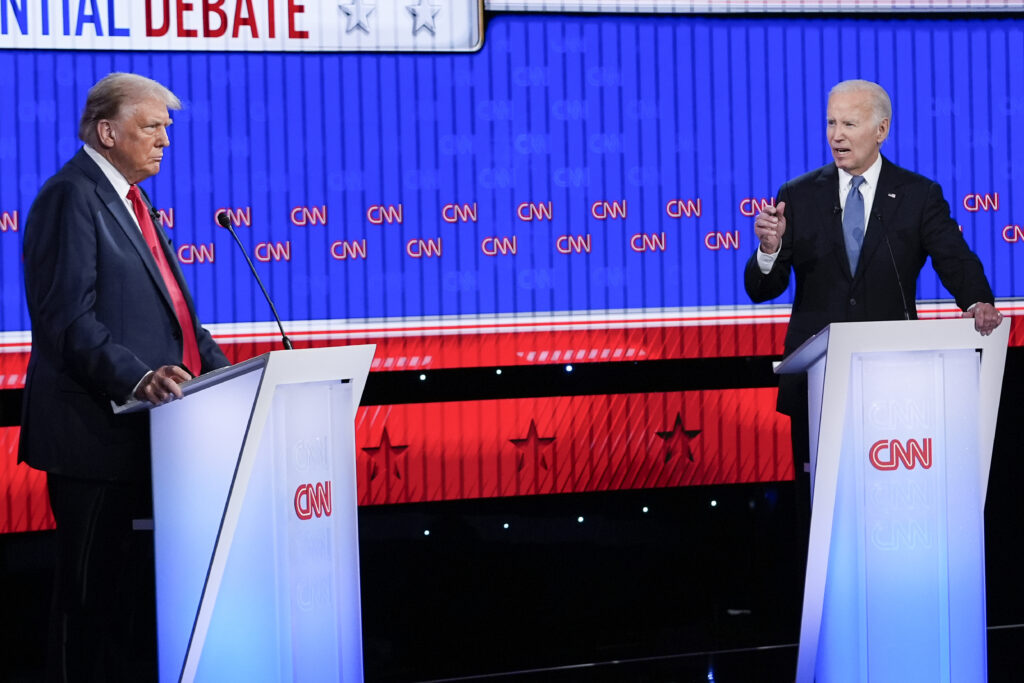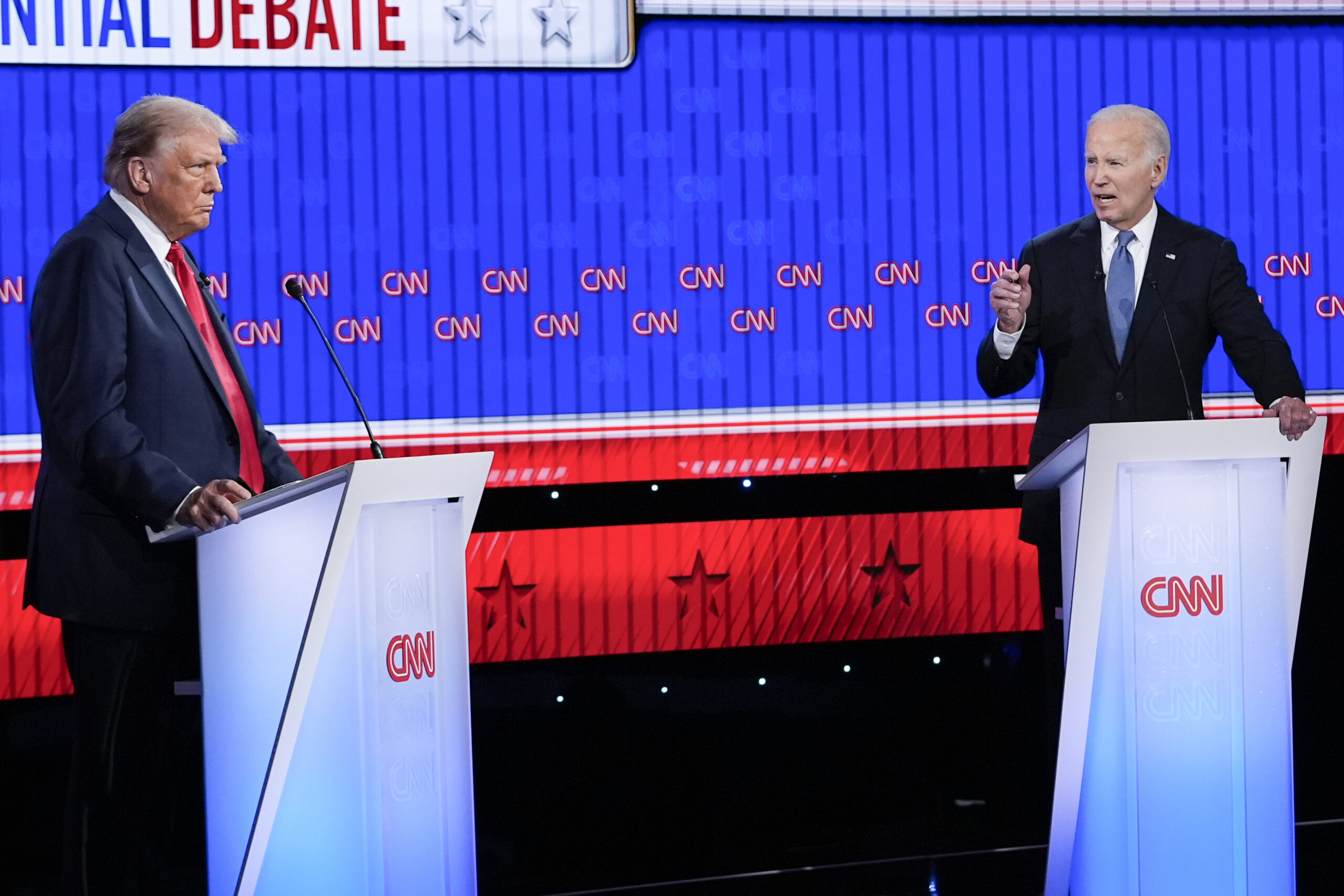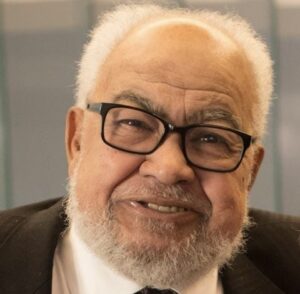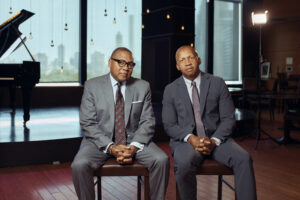Protests after the 2020 death of George Floyd and a reference to “Black jobs” were among the topics tossed around during a hostile first debate in the 2024 White House race between President Joe Biden and his Republican opponent, former President Donald Trump.
The session that saw Biden — losing his voice and said to be battling a cold — stumbling through his words and Trump unleashing a flood of untruths took place at CNN headquarters in Atlanta. It was the first of two scheduled presidential debates.

CNN journalists and moderators Jake Tapper and Dana Bash quizzed the candidates on topics ranging from the economy, the Israel/Hamas war, immigration, and even American democracy itself.
But much of the focus was on the candidates — Biden, 81, and Trump, 78 — and how they comported themselves. On the one hand, there was Trump, who took control of the debate by the sheer force of a fire hose of untruths. On the other hand, there was Biden, who appeared pale and struggled to answer questions for much of the debate’s first half.
Biden’s condition led Democratic operatives to wonder in televised post analysis whether the president was up to a campaign or second term. While many of Biden’s responses centered on accomplishments in office, others were rambling and hard to understand.
For example, when Biden was asked about abortion rights, his answer veered into the topic of immigration for no apparent reason.
Another topic was both candidates’ relationships with the Black Americans. Last weekend, Trump held a rally at Temple University in North Philadelphia as part of his outreach to the Black community.
When Tapper asked Trump why Black voters should consider him, he tied his answer to an attack on Biden’s “open borders” policy.
“The fact is that his big kill on the Black people is the millions of people that he’s allowed to come in through the border,” Trump said. “They’re taking Black jobs now and it could be 18, it could be 19, and even 20 million people. They’re taking Black jobs, and they’re taking Hispanic jobs, and you haven’t seen it yet, but you’re gonna see something that’s going to be the worst in our history.”
The NAACP, for one, had questions.
“We’re still trying to figure out what a #BlackJob is,” the civil rights organization posted via X. “Because if it’s showing up every day to build a democracy that continues to undermine us, we’ve been doing that since 1619.”
In fact, Trump’s “Black jobs” comment created a trending topic on Twitter.
“I have a law degree. Does that get me a black job?” former Atlanta Mayor Keisha Lance Bottoms posted.
When the topic of the Jan. 6, 2021, riot at the U.S. Capitol came up, Trump defended the more than 1,400 people charged with crimes as a part of that incident, calling them “patriots.”
He then deflected by bringing up the protests in Minneapolis and around the world after the May 25, 2020, death of George Floyd, who died after convicted murderer and former police officer Derek Chauvin pressed a knee to his neck.
“If I didn’t bring in the National Guard, that city would have been destroyed,” Trump said.
In actuality, it was Gov. Tim Walz who activated the Minnesota National Guard.
Trump also renewed his threat to not only prosecute the members of the House Select Committee to Investigate the Jan. 6th Attack on the U.S. Capitol, but also Biden as retaliation for convictions related to the riot but the related charges that Trump himself faces.
“What they’ve done to some people who are so innocent, you ought to be ashamed of yourself,” Trump said. “Joe could be a convicted felon. Look at all of the horrible things he’s done.”
When Trump chose to throw Biden’s son Hunter, who was recently convicted on an illegal firearms charge, the president took the gloves off.
The president referenced Trump’s felony conviction last month in paying hush money to adult film star Stormy Daniels to keep her quiet before the 2016 election about a tryst, and the earlier $88.3 million defamation award to writer E. Jean Carroll, who accused Trump of sexual assault.
“The only person on this stage who’s a convicted felon is the man I’m looking at,” Biden said. “How many billions of dollars do you owe in civil penalties, for molesting a woman in public, for doing a whole range of things, for having sex with a porn star on the night while your wife was pregnant? What are you talking about? You have the morals of an alley cat.”
Although the debate itself earned CNN no fans on social media and other spaces because of what was seen by many as the network allowing Trump to run amok as Biden appeared to age live on national television, that wasn’t the only issue the network faced.
Before the debate, the National Association of Black Journalists issued a statement condemning CNN for denying press credentials for correspondents for several local and national news outlets connected to the Black press. More than 800 news outlets applied for credentials to cover the event and requests had to be submitted by June 7, according to the statement.
CNN was asked to reconsider but refused, citing venue size and security concerns.
Among the outlets denied credentials were the Atlanta Voice, the Atlanta Black Star, the National Newspaper Publishers Association, a wire service for the Black Press, Ebony magazine, and Black Enterprise.
This is the first debate not sponsored by the bipartisan Commission on Presidential Debates since the nonprofit organization was formed in 1987. In May, the Biden campaign informed the commission that he wouldn’t be participating in any debate sponsored by them, citing the dates originally chosen by the group and a perception on the campaign’s part of unfair enforcement of the debate rules during the 2020 Presidential Campaign.
The next presidential debate will take place on Sept. 10 and will be broadcast by ABC News.







